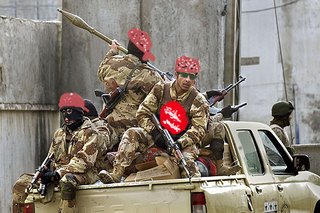
Sectarian Ties Weaken Duty’s Call for Iraq Forces
By MARC SANTORA
Published: December 28, 2006
BAGHDAD, Dec. 27 — The car parked outside was almost certainly a tool of the Sunni insurgency. It was pocked with bullet holes and bore fake license plates. The trunk had cases of unused sniper bullets and a notice to a Shiite family telling them to abandon their home.
“Otherwise, your rotten heads will be cut off,” the note read.
The soldiers who came upon the car in a Sunni neighborhood in Baghdad were part of a joint American and Iraqi patrol, and the Americans were ready to take action. The Iraqi commander, however, taking orders by cellphone from the office of a top Sunni politician, said to back off: the car’s owner was known and protected at a high level.
For Maj. William Voorhies, the American commander of the military training unit at the scene, the moment encapsulated his increasingly frustrating task — trying to build up Iraqi security forces who themselves are being used as proxies in a spreading sectarian war. This time, it was a Sunni politician — Vice Prime Minister Salam al-Zubaie — but the more powerful Shiites interfered even more often.
“I have come to the conclusion that this is no longer America’s war in Iraq, but the Iraqi civil war where America is fighting,” Major Voorhies said.
A two-day reporting trip accompanying Major Voorhies’s unit and combat troops seemed to back his statement, as did other commanding officers expressing similar frustration.
“I have personally witnessed about a half-dozen of these incidents of what I would call political pressure, where a minister or someone from a minister’s office contacts one of these Iraqi commanders,” said Lt. Col. Steven Miska, the deputy commander for the Dagger Brigade Combat Team, First Infantry Division, who oversees combat operations in a wide swath of western Baghdad.
“These politicians are connected with either the militias or Sunni insurgents.”
Whatever plan the Bush administration unveils — a large force increase, a withdrawal or something in between — this country’s security is going to be left in the hands of Iraqi forces. Those forces, already struggling with corruption and infiltration, have shown little willingness to stand up to political pressure, especially when the Americans are not there to support them. That suggests, the commanders say, that if the Americans leave soon, violence will redouble. And that makes their mission, Major Voorhies and Colonel Miska say, more important than ever.
They added that while political pressure on the Iraqi Army is great, the influence exerted on the police force, which is much more heavily infiltrated by Shiite militia groups, is even greater.
Shiites, led by militia forces and often aided by the local police, are clearly ascendant, Colonel Miska said.
“It seems very controlled and deliberate and concentrated on expanding the area they control,” he said.
The Sunni forces are being bolstered by support from insurgent strongholds in the West. The Shiite militias are using neighborhoods in the north, specifically Shuala and Sadr City, as bases of operation. There is also increasing evidence that militia members from southern cities like Basra are coming to Baghdad to join the fight.
“I believe everyone, to some extent, is influenced by the militias,” Colonel Miska said. “While some Iraqi security forces may be complicit with the militias, others fear for their families when confronting the militia, and that is the more pervasive threat.”
Looking at a map he had his intelligence officers create, which highlights current battle zones and details the changing religious makeup of neighborhoods, Colonel Miska noted just how many different forces, each answering to different bosses, currently occupied the battlefield.
No comments:
Post a Comment